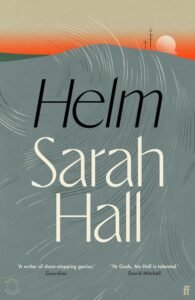
Twenty years in preparation Hall brings us a story of Helm, the only named wind in the UK. Naturally, this prompts the question, ‘Know any other winds?’. I had thought about Scirocco, the Mediterranean southerly that is also synonymous with Volkswagen’s squashed Beetle. But of course, there are others less tied to consumerism. Many of these winds have been personified; the forces are given human traits on top of their natural character. Hall applies this to the story of Helm, a wind observing human development and in turn is incorporated into mythology and folklore.
A dominant force in Cumbria’s Eden Valley, Helm, the wind, takes an ethereal but equally human vantage on Cross Fell; there are strong parallels here with the Greeks and their Gods on top of Olympus. Not knowing itself, Helm is defined through the opinions of the humans that experience it.
Broadly, the story spans at least four distinct time periods and describes those dwelling in the Eden Valley, co-habiting with Helm. Interweaved throughout the story but chronologically first, we travel into the neolithic period with NaNay a tribal leader who looks to stand against the wind, proving her fortitude and enforcing her selection into the tribal hierarchy as a seer.
In the 13th Century, a former crusader, wizard priest, exorcist and zealot comes to Eden to purge this devilish wind and purify the fell in the name of Christ. His is a story of force and fortitude but also imbalance. Religion and superstition swirl as one as Michael Lang processionally moves through the monasteries on his way to battle demons both inner and outer.
As we head into the modern day, there’s a change in approach. With the passing of the Renaissance and into the age of industry, there is now less of a concrete belief in the mythical or demonic entity but more a consideration of Helm as a meteorological force to be understood. So enters a Georgian/Victorian era member of the Meteorological Society of London and an advocate for study in the age of steam. Thomas Bodger’s story sits on the interface between science and belief. Locals have no understanding of why or how he will be able to measure the Helm wind with what seems to be a giant kettle. But pursue he must, as questions are there to be answered.
In the contemporary world, the importance of the scientific method for understanding comes proportionally to the fore. In modern day Cumbria, Dr Selima Sutar, climate scientist from Manchester, is up at the weather station to understand changes to the Helm wind. Rather soberingly, an aspect of her research highlights the levels of plastics in clouds, in the air and in rainwater. We know of plastics in drinking water, in bodies and in the feotuses, but this observation hammers home the insidious nature of plastic: it accumulates everywhere and there is no degradation. Hall, through Selima’s story, shows us the ills that humans have caused to the environment and, by association, to Helm.
‘Helm is not feeling Helmself today, actually’
This is an expansive story of humanity and our relationship with the environment. There is a real flow to the language; dialogue is rendered through Helm and so is represented using italics. Gaps between the major plot threads, Helm expositional segments, are verse-like: they have a sweeping cadence anchored by half-rhyme. There’s an obvious skill to the subtle conjuration of ideas and themes in Helm, particularly those relevant to the concerns of today. Environmental disaster is described as a very real endpoint and we view the struggle for its reversal much like an umpire; as Helm we watch human forces wrestle for an eventual outcome – collapse or resolution. Whilst thematically deep, there is lightness, fun and thrill to the writing. Helm feels like a playful story: the writing feels as though Hall enjoyed putting it together.
In addition to the environment, Hall also tackles the rise of AI in publishing. AI is a tool that minimally threatens to water down the quality of human-made stories, it is a direct challenge to the craft. Hall’s counterthrust is to be the first to introduce a maker’s mark ‘Human Made’ on the book’s dust jacket. This feels like a ‘flag in the sand’ moment for publishing as we overtly acknowledge the dangers AI poses for the creative industry.
I enjoyed this book and there’s been plenty of positive buzz on the socials and in earlier reviews. Perhaps many were surprised not to see it longlisted for this year’s Booker Prize. Why might this be? Hall has already been twice nominated and an expansive story from the perspective of the UKs only named wind does feel like a relatively unique proposition. So the quality and scope is there. Is Helm then simply too cheeky for the Booker? Well, Helm does love a fart joke and a little bit of hot air balloon voyeurism. But overall, I think not, and so it’s exclusion really reflects the high quality of publications this year. Helm is contemplative and deep enough for any prize.
‘And if we are not seen, are we not real? If we are not believed, have we no form and pain and purpose in the world? Whosoever loves us, do they love us when they no longer remember us?’
Helm is a great and expansive work paying homage to the environment of rugged, real Cumbria, which is of course outside of the tourist traps and ‘round the edges’.